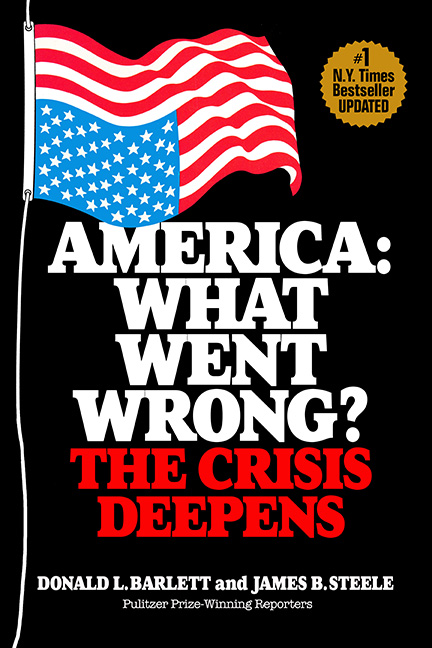Books

America: What Went Wrong? The Crisis Deepens
From the Prologue
Over the past half-century, with a couple of modest exceptions, the pendulum has swung disastrously onto the side of the wealthy and those who oppose government action in the economy. The result has kept the poor in poverty, clamped a death grip on the middle class and made the rich richer.
No one disputes that the free market is a powerful force that stimulates innovation and a multitude of new enterprises that create vast individual fortunes. But it hasn’t lifted all boats. Too many Americans are mired in place or losing ground. Relegating government to the sideline has created an increasingly unequal society, and restoring that balance would not affect the lifestyle of a single wealthy family in America.
The consequences of U. S. policies hostile to government were brutally exposed by the onset of the coronavirus. The federal government had no national plan to deal with it – no plan to make sure that vital equipment to save lives got to the health care community, no plan to warn all citizens of the danger the virus posed, no plan to institute containment measures to slow its spread. The response to a national calamity was left to the woefully unprepared private market and to divergent state and local governments. But the disaster was of a magnitude that required coordinated public action from coast to coast, not private initiative.
The problem went beyond the bumbling Trump administration, which refused to face the danger until the virus reached America’s shores. Years of touting the benefits of a market-driven health care system by opponents of government left the nation with fewer hospital beds per capita than any other major developed nation. The number of hospital beds shrank 16 percent from 1975 to 2018 during a period when the U.S. population increased by 50 percent. The U. S. figure, 2.8 beds for every 1,000 persons, was dramatically lower than that of France (5.9 beds per 1,000); Germany (8 beds per 1,000), and Japan (13 beds per 1,000). Even China, with 4.34 beds per 1,000, could take care of a greater share of its people than the U.S.
When the pandemic and its economic impact have passed and the familiar rhythms of American life have returned, the problems the virus exposed will still be with us and crying for action. For all the pain the pandemic has caused, it signals to the nation an opportunity to restructure government to meet the needs of all its citizens, not just on health care but on taxes and economic security so that we can finally start to reduce income inequality and make good on the promise of the American dream for all America.
More than ever, the time has come to reverse this half-century-long march to plutocracy, to acknowledge that after decades of corporate excesses and private greed, the time has come for government to reassert itself on behalf of all the people, to create a tax system that rewards all Americans, not just the rich, to fashion a regulatory environment that balances the interests of workers and companies, to create a framework that assures all Americans of basic health care and a decent retirement, and to invest in America, thereby creating good-paying jobs so that all hard-working men and women will have a ticket to the middle class.
The structural problems in our system that are dismantling the middle class are not new. But they are intensifying. What is new is an urgent need to confront them and to rebuild the middle class. Unless these trends are reversed, the American dream is over, with an elite class of Americans at the top and the vast majority of Americans at the bottom. The U.S. will then look more like a banana republic than the world’s first modern democracy.
But there are some hopeful signs: We see in many young people, especially those who have become active in the 2020 presidential race, a desire to adopt a better health-care system, a more equitable tax code, a higher minimum wage and to curtail the virtually unrestrained power of large corporations to mistreat their workers and despoil the environment.
They are our hope. They are America’s hope. They know the time has come to take back the country.









